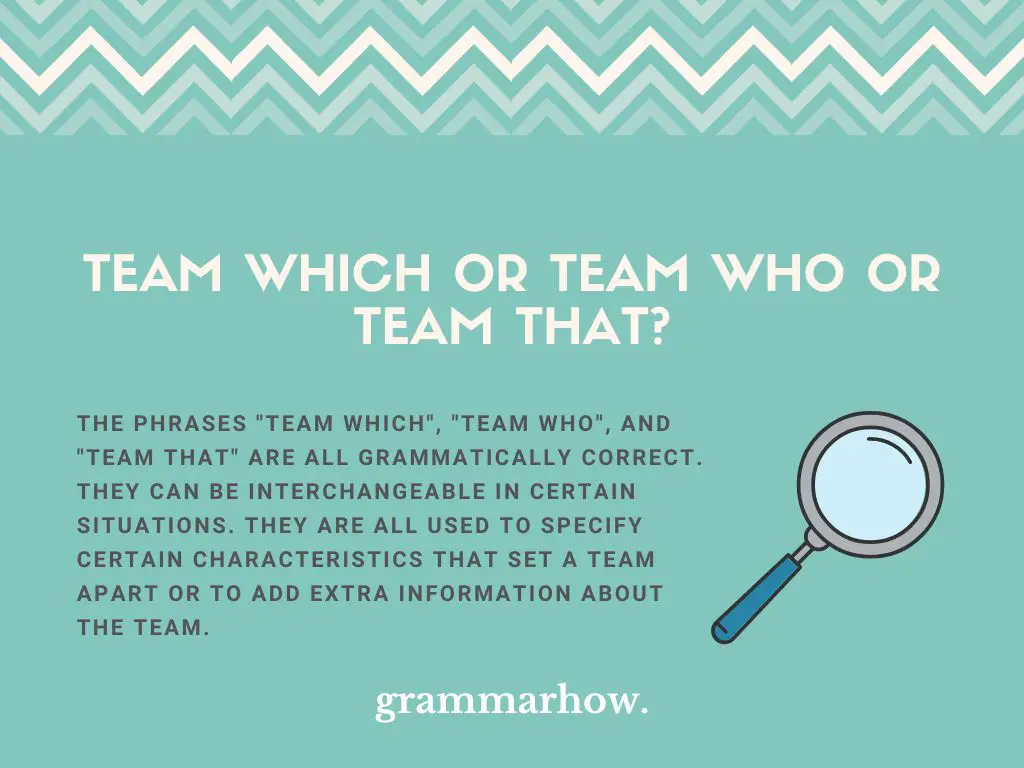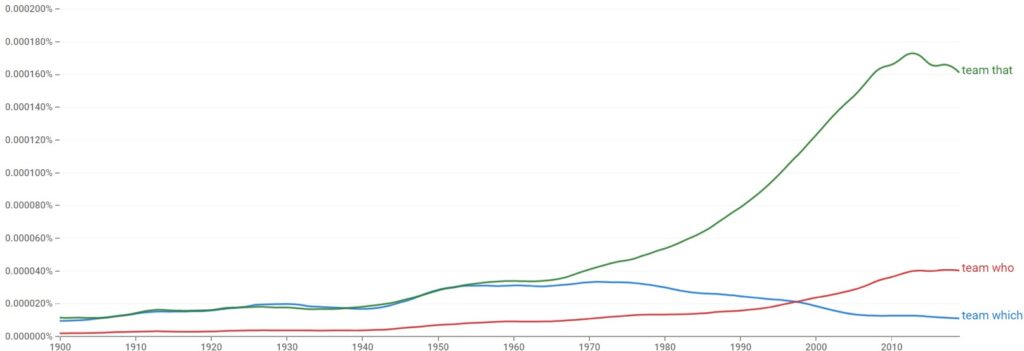This article explores when to use the words typically used to talk about a team: “which”, “who”, and “that”.
Team Which or Team Who or Team That?
The phrases “team which”, “team who”, and “team that” are all grammatically correct. They can be interchangeable in certain situations. They are all used to specify certain characteristics that set a team apart or to add extra information about the team.

“Team which”, “team who”, and “team that” are all grammatically correct. These are phrases used to specify the characteristics of a team or add extra information about the team.
In certain situations, these phrases are interchangeable. Take a look at the sentences below, for example:
- I’m looking for the team which won the championships this afternoon.
- I’m looking for the team who won the championships this afternoon.
- I’m looking for the team that won the championships this afternoon.
All three sentences express the same meaning: that the speaker is looking for the team who won the championships. You are likely to hear all three versions of the sentence being used in casual everyday conversation.
However, you can also opt to use one of the three depending on what characteristic you want to emphasize about the team you are talking about.
“Who” is used to refer to people, so it is used when you want to emphasize the people who make up the team. “Which” refers to the team as a unit, while “that” is more versatile and can be used for either.
Team Which
The phrase “team which” is used to specify something about the team that sets it apart from other teams or to add extra information about the team.
The word “which” is a determiner that can be used with the word “team” and its plural form “teams”.
“Team which” can be used to specify something about the team, usually something that sets it apart from other teams. It can also be used to add extra information about the team.
While it can be used interchangeably with “team who” and “team that”, “team which” is used to refer to emphasize characteristics of the team as a unit, rather than the individual members of the team.
Below are examples of how to use the word “which” with “team” or “teams”:
- The teams which don’t train will be eliminated.
- The team, which before yesterday did not exist, won the game.
- He was reluctant to coach the team which set the record for most losses in a season.
- Which team are you choosing to bet on?
- The teams which don’t report are disqualified.
Team Who
“Team who” is a phrase used to specify a particular characteristic about the team or to add extra information about the team.
The word “who” is a pronoun that can be used with the word “team” and its plural form “teams”.
The phrase “team who” can be used to specify the characteristics of a team. It can also be used to add extra information about a team.
The use of the word “who” emphasizes the individual members of the team, unlike when the words “that” are “which” are used with the word team. However, it is often used interchangeably with “team that” and “team which”.
Below are examples of how to use the word “who” with “team” or “teams”:
- I want to coach teams who love the game as much as I do.
- The members of the team, who seemed incredibly lethargic yesterday, won the game.
- She was reluctant to coach the team who set the record for most losses in a season.
- No one wants to support a team who does not train.
- The teams who don’t turn in their answers in five minutes are disqualified from the contest.
Team That
You use the phrase “team that” to specify an aspect of a team that sets it apart from other teams or to add extra information about the team.
The word “that” is a determiner that can be used with the word “team” and its plural form “teams”.
“Team that” is a phrase that can be used to specify something about the team, usually an aspect or characteristic that sets it apart from other teams. It can also be used to add extra information about the team.
“Team that” is often used interchangeably with “team who” and “team which”. However, while “team which” is used to refer to emphasize characteristics of the team as a unit and “team who” emphasizes the individual members of the team, “team that” is more versatile.
Below are examples of how to use the word “that” with “team” or “teams”:
- There are teams that are destined for greatness, and there are teams that aren’t.
- The team that seemed most unlikely to win surprisingly won the game.
- They were reluctant to join the team that set the record for most losses in a season.
- I believe the team that believes in itself is bound to win.
- The teams that don’t turn in their financial reports are disqualified.
Which Is Used the Most?
Based on data from Google Ngram Viewer, “team that” is the most popular among the three phrases, followed by “team who”, and the least used is “team which”.
Google Ngram Viewer can show us how often all three phrases are used in a wide range of books. According to data from books written in English between the years 1900-2019, the phrase “team that” is the most popularly used among the three. It is more popular than “team who” and “team which” by a large margin.

“Team who” is currently the second most commonly used of the three. However, it was actually the least popular of the three up until about 1997.
“Team which” is currently the least commonly used. However, it was just as popular as “team that” up until 1953. It began to decline in popularity following this and ultimately sank below “team who” after 1997.
Final Thoughts
The phrases “team which”, “team who”, and “team that” are all used to specify certain characteristics that set a team apart or to add extra information about the team. These phrases are all grammatically correct and can be interchangeable in certain situations.
You may also like:
Team Is or Team Are – Is “Team” Singular or Plural?
“Part of The Team” vs. “A Part of The Team”: Correct Version
Companies Who or Companies Which or Companies That?

Martin holds a Master’s degree in Finance and International Business. He has six years of experience in professional communication with clients, executives, and colleagues. Furthermore, he has teaching experience from Aarhus University. Martin has been featured as an expert in communication and teaching on Forbes and Shopify. Read more about Martin here.
